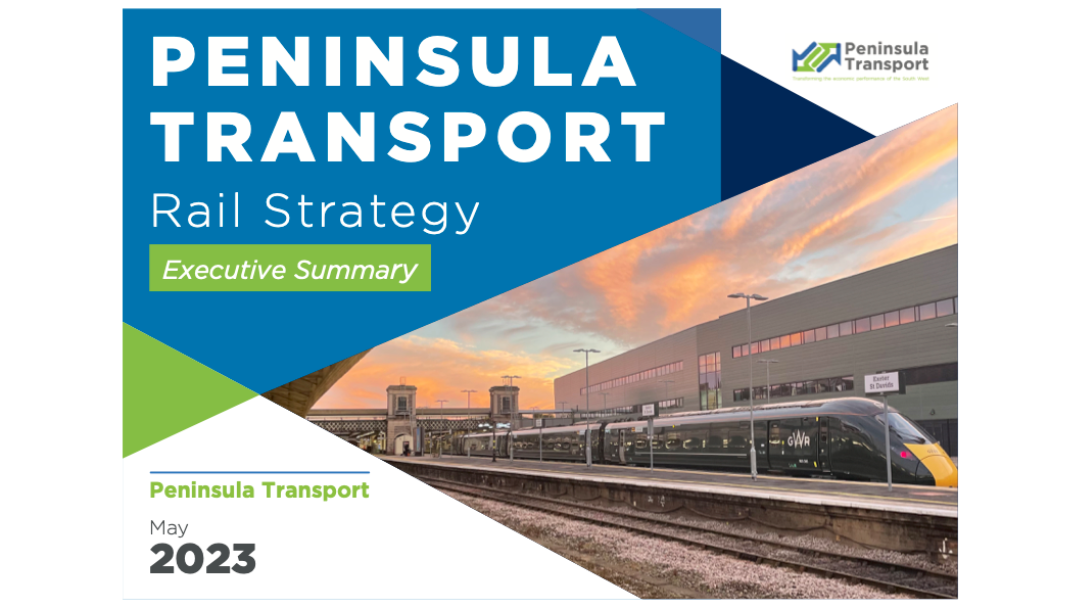Peninsula Transport, the Sub-National Transport Body (STB) for Cornwall, Devon, Plymouth, Somerset and Torbay, has published a strategy outlining how rail underpins the region’s future economic growth while helping to meet climate goals.
The rail strategy comes at a time of massive change on the South West’s railways, with passengers making new travel choices following the COVID-19 pandemic. Increases in home and remote working have led to a drop in commuting by train, but more passengers are using the region’s train lines for days out and holidays. The cost of living crisis and national rail strikes have added to the challenges faced by the network.
The strategy builds on Closing the Gap, the 2016 plan for the South West’s rail network produced by the Peninsula Rail Task Force (PRTF). Closing the Gap cemented cross-industry support for critical resilience upgrades to the mainline between Exeter and Newton Abbot following the sea wall collapse at Dawlish in 2014. However, many of the issues raised in the original plan remain to be addressed, and new challenges have arisen.
The government has committed to fully implement the South West Rail Resilience Programme which is designed to safeguard the line at Dawlish. The new rail strategy highlights other stretches of track which remain at risk from rising sea levels or flooding and require further protection.
These include sections of the main London line at Cowley Bridge junction near Exeter and through the Somerset Levels. Both have benefited from resilience schemes, but services are still sometimes disrupted by floods.
The strategy also highlights the vital role the peninsula’s railways will play in decarbonising the transport network, particularly for the freight sector. For passengers, rail is one of the most planet-friendly ways to travel, responsible for only about one per cent of the UK’s carbon transport emissions. However, challenges remain with 1980s and 1990s diesel rolling stock on South West branch lines likely to need replacing before lower carbon replacements are available.
Continuous mobile connectivity for rail users and communities near rail lines is another priority identified in the strategy. Peninsula Transport is working with Network Rail to secure funding to allow passengers to remain connected as they travel.
The strategy sets out five priority themes:
- Improving choice: making rail the natural choice for passengers and freight through quicker, simpler and more affordable journeys.
- Reducing emissions: switching passengers and freight to rail to relieve pressure on roads.
- Supporting demographic change: making stations more accessible and growing the rail network to connect new communities as the population expands.
- A resilient network: continuing to highlight risks of disruption to the rail network in vulnerable areas.
- Underpinning growth: making the region’s towns and cities more accessible by rail.
The strategy identifies a series of short term initiatives which could be delivered in the next 1- 2 years. These include integrated ticketing and timetabling between rail and other types of transport and the expansion of the Devon and Cornwall Rail Card to include Somerset.
Councillor Andrea Davis, Chairman of Peninsula Transport, said: “Better, more integrated rail services are vital to the future prosperity of the South West, and also essential to decarbonising our transport system as a whole.
“For the South West, we have been united in making the case for rail improvements for years. The peninsula been constant in its message to government that the resilience of our rail network is crucial.
“The government’s recent announcement that it would fund the South West Rail Resilience Programme in full shows what the region can achieve when we work together to ensure protecting our strategic infrastructure is treated as a priority. In October, Storm Babet put the new sea defences protecting the line at Dawlish to the test. Services were disrupted, although we did not experience the longer term problems the region suffered in 2014. The ongoing threats from severe weather underline the importance of making our rail network as resilient as possible.”
Councillor Mark Coker, Chair of the Peninsula Rail Task Force, said: “Our ambition has always been to improve resilience and deliver better rail services. As the region’s population grows, we will need to connect new communities to the network and offer speedy, simple and affordable journeys so rail becomes the obvious choice for more people.
“As well as offering an enhanced service for passengers, investment in the South West’s infrastructure has enormous potential to unlock growth in rail freight, helping the region’s businesses while contributing to efforts to reduce carbon emissions by diverting more goods away from roads.”
The rail strategy is available on our rail webpage.

